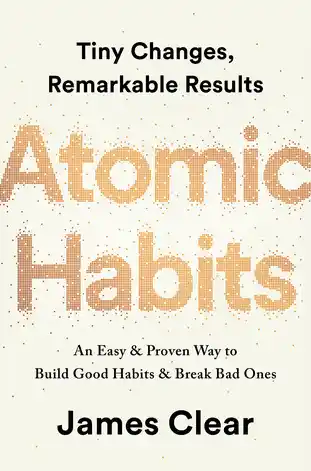Atomic Habits (PDF/ePub) by James Clear Read Online now for free and Download the Book.
Atomic Habits ePub/PDF Description
| Book Name: | Atomic Habits |
| Author: | James Clear |
| Language: | English |
| File Type: | PDF/EPUB (Downloadable) |
| PDF Size: | 5.87 MB |
| ePub Size | 1.69 MB |
| Pages | 383 |
| Also Read | The Power Of Your Subconscious Mind Pdf (Original) Latest Edition |
Whatever it is you want to achieve, Atomic Habits provides a tried-and-true plan for doing so, one small step at a time. James Clear, one of the world’s foremost authorities on habit formation, shares his tried-and-true methods for developing positive routines, overcoming negative ones, and becoming an expert at the seemingly insignificant actions that add up to extraordinary outcomes.
It’s not you, the person, who has a problem changing their habits. Your setup is flawed. It’s not that you don’t want to break bad habits; it’s that you’re using the wrong method to do so. You never seem to reach the heights of your ambitions. You become as technological as your systems allow. In this article, you’ll find a tried-and-true method that can help you reach new heights.
Clear has earned a reputation for his ability to simplify difficult concepts into actions that can be implemented immediately. Here, he synthesises the best research from biology, psychology, and neuroscience into a user-friendly manual for permanently replacing bad habits with good ones. Success tales from Olympic gold medalists, award-winning artists, corporate executives, life-saving specialists, and superstar comedians who have benefited from the science of little habits to master their trade and rise to the top of their area will inspire and entertain readers along the way.
Find out how to: – fit in new routines into your schedule (even when life gets hectic); – overcome a lack of motivation and willpower; – create a favourable environment for success; – pick yourself up and start again after a setback;…and much more.
Atomic Habits will transform the way you view success and provide the tools and strategies you need to make lasting changes in your life, whether you’re a team trying to win a championship, a company trying to redefine an industry, or an individual trying to quit smoking, lose weight, reduce stress, or achieve any other goal.
About James Clear Author
Official Website: https://jamesclear.com/
The book “Atomic Habits: An Easy & Proven Way to Build Good Habits and Break Bad Ones” was written by James Clear.
On jamesclear.com, he discusses habits, decision making, and constant improvement. Millions of people visit his site every month, and tens of thousands sign up for his email newsletter.
His writing has been featured on CBS This Morning and in the New York Times and Entrepreneur, among other publications. His work is used by teams in the NFL, NBA, and MLB, and he is a frequent speaker at Fortune 500 companies.
Atomic Habits Book Summary
This book does an excellent job of providing a theoretical framework for understanding habit formation and offering helpful suggestions for both forming and breaking habits. This book helped me think about the habits I’m trying to form or break in a new way, even though I was already familiar with the research behind habit formation.
However, it has the same issues that plague other self-help books. The author tells a story in the chapter on habit tracking about how Benjamin Franklin kept a journal of his “thirteen virtues” and carried it with him wherever he went. If you’re interested, Franklin tried to turn practising each of his thirteen virtues into a thirteen-week course, documenting his progress after each week. Franklin found this approach impractical and gave up on the project before he had finished listing all thirteen virtues, but the author conveniently ignores this fact. Putting this story in a section that emphasises the value of not “breaking the chain” is a bit ironic. So, while the author isn’t completely wrong, I found it annoying that he retold the story to make it fit his narrative. You have to question the author’s intelligence when you see this flaw, and it’s unfortunately common in self-help and popular science books.
This book could have been even shorter, which is another complaint I have with it. Under “Advanced Tactics,” the final chapters on mastery were the book’s weakest. There is a clear link between habits and mastery, but it may have been too ambitious to attempt to draw connections between habits and such a nuanced concept.
Habits are the bedrock of your life, as the author so rightly points out. Building good habits is the only surefire way I know of to make significant changes in one’s life. Highly recommended if you need convincing of the value of good habits. Skimming this book quickly will give you good ideas on how to make changes stick if you are already convinced but finding it difficult to adopt or break habits.
Conclusion
My new favourite nonfiction work in the genre of “self-help” is this one.
This book doesn’t talk in a way that makes you feel overwhelmed or that everything you do is wrong or inadequate, yet it is still completely engrossing and quite convincing in its ability to make you want to change your bad habits and adopt good ones.
You won’t find any fluffy advice here; instead, you’ll find stories and lessons on how to build and sustain the kinds of habits that will serve you well in the long run, as well as on how to finally get around to doing the things you’ve always wanted to do.
